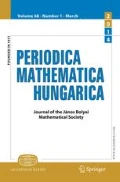Abstract
We study digit expansions with arbitrary integer digits in base q (q integer) and the Fibonacci base such that the sum of the absolute values of the digits is minimal. For the Fibonacci case, we describe a unique minimal expansion and give a greedy algorithm to compute it. Additionally, transducers to calculate minimal expansions from other expansions are given. For the case of even integer bases q, similar results are given which complement those given in [6].
Similar content being viewed by others
References
A. D. Booth, A signed binary multiplication technique, Quart. J. Mech. Appl. Math. 4 (1951), 236–240, MR 12,860a.
P. Flajolet and L. Ramshaw, A note on Gray code and odd-even merge, SIAM J. Comput. 9 (1980), 142–158, MR 81h:68025.
P. Grabner, C. Heuberger and H. Prodinger, Subblock occurrences in signed digit representations, Glasg. Math. J. 45 (2003), 427–440.
R. L. Graham, D. E. Knuth and O. Patashnik, Concrete mathematics – A foundation for computer science, (2nd edn.), Addison-Wesley, 1994, MR 97d:68003.
C. Heuberger, Minimal redundant digit expansions in the Gaussian integers, J. Théor. Nombres Bordeaux 14 (2002), 517–528.
C. Heuberger and H. Prodinger, On minimal expansions in redundant number systems: Algorithms and quantitative analysis, Computing 66 (2001), 377–393.
C. Heuberger and H. Prodinger, Carry propagation in signed digit representations, European J. Combin. 24 (2003), 293–320.
M. Joye and S.-M. Yen, Optimal left-to-right binary signed digit recoding, IEEE Transactions on Computers 49, No.7 (2000), 740–748.
J. L. Massey and O. N. Garcia, Error-correcting codes in computer arithmetic, Advances Inform. Syst. Sci. 4 (1972), 273–326.
F. Morain and J. Olivos, Speeding up the computations on an elliptic curve using addition-subtraction chains, RAIRO Inform. Théor. Appl. 24 (1990), 531–543, MR 91i:11189.
G. W. Reitwiesner, Binary arithmetic, Advances in computers, Vol. 1, Academic Press, New York, 1960, 231–308.
E. Zeckendorf, Représentation des nombres naturels par une somme de nombres de Fibonacci ou de nombres de Lucas, Bull. Soc. Roy. Sci. Liège 41 (1972), 179–182, MR 46 #7147.
Author information
Authors and Affiliations
Rights and permissions
About this article
Cite this article
Heuberger, C. Minimal expansions in redundant number systems: Fibonacci bases and Greedy algorithms. Period Math Hung 49, 65–89 (2004). https://doi.org/10.1007/s10998-004-0523-x
Issue Date:
DOI: https://doi.org/10.1007/s10998-004-0523-x


